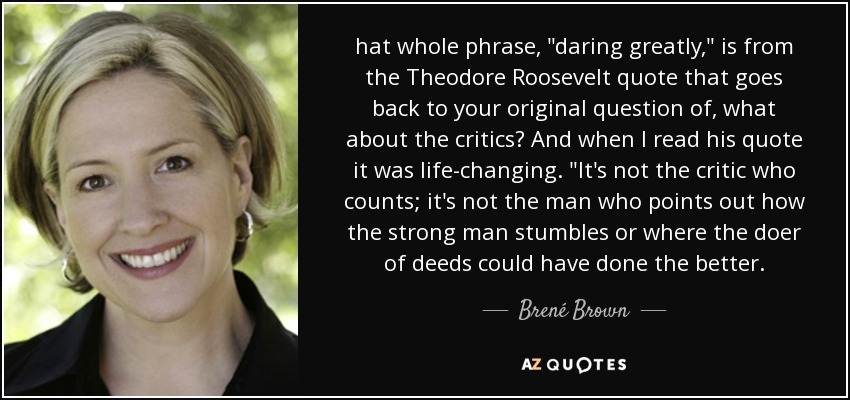

She published her book, “Daring Greatly,” in 2012, citing Roosevelt’s speech.īoth of those works (and many more) by Brené have resonated in the world, in multiple languages, endlessly. The credit belongs to the man who is actually in the arena, whose face is marred by dust and sweat and blood who strives valiantly who errs, who comes short again and again, because there is no effort without error and shortcoming but who does actually strive to do the deeds who knows great enthusiasms, the great devotions who spends himself in a worthy cause who at the best knows in the end the triumph of high achievement, and who at the worst, if he fails, at least fails while daring greatly, so that his place shall never be with those cold and timid souls who neither know victory nor defeat.”īrené gave her most famous TED Talk, “The Power of Vulnerability,” a century after Roosevelt initially spoke those words.

“It is not the critic who counts not the man who points out how the strong man stumbles, or where the doer of deeds could have done them better.

The renowned passage originally was part of a speech (“Citizenship in a Republic”) Roosevelt gave in 1910 at the Sorbonne in Paris soon after his second term as U.S. I often think of Teddy Roosevelt’s “man in the arena.” But I admit that it’s etched most firmly in my brain by Brené Brown, rather than any penchant for memorizing presidential speeches. Podcast cover art and art below: Adam Williams 17, 2023)Īlso on Apple, Spotify, Pandora, Stitcher, YouTube, Google and other players. 123), Adam Williams shares about his experience with the conflicting voices in his head, including Brené Brown’s, Teddy Roosevelt’s and his imagined critics’, every time he creates as a writer, poet, artist, podcaster … whatever the creative medium. Overview: In this short solo episode (Ep.


 0 kommentar(er)
0 kommentar(er)
